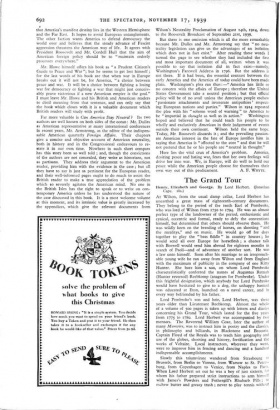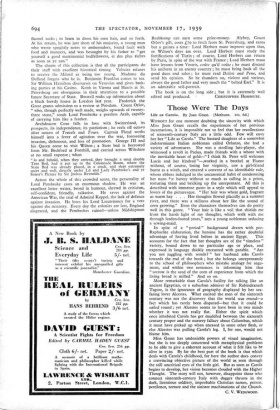The Grand Tour
AT Wilton, from the usual damp cellar, Lord Herbert has unearthed a great mass of eighteenth-century documents. They belong to the period of the tenth Earl of Pembroke, who was lord of Wilton from 1750 to 1794. He was an almost perfect type of the landowner of the period, enthusiastic and cynical, eccentric and formal, ready to defy the conventions himself, but determined that others should observe them. He was wildly keen on the breeding of horses, on shooting " and the ruralitys," and on music. He would go off for days together to play the " bass fiddle " in country houses ; he would send all over Europe for horseflesh ; a chance talk with Boswell would send him abroad for eighteen months in search of Paoli—and of adventure of another sort. He was a law unto himself. Soon after his marriage to an irreproach- able young wife he ran away from Wilton and from England with the maximum of publicity in the company of one Kitty Hunter. She bore him a son, on whom Lord Pembroke characteristically conferred the names of Augustus Retnuh (Hunter reversed) Reebkomp (anagram for Pembroke). Under this frightful designation, which anybody but Lord Pembroke would have hesitated to give to a dog, the unhappy bastard was educated at Eton, launched on a naval career, and in every way befriended by his father.
Lord Pembroke's son and heir, Lord Herbert, was three years older than Lieutenant Reebkomp. Almost the whole of a volume of 500 pages is taken up with letters and diaries concerning his Grand Tour, which lasted for the five years from 1775 to 1780. Lord Herbert was accompanied by two mentors. The Reverend William Coxe, later the author of many Memoirs, was to instruct him in poetry and the classics, in philosophy and billiards, in Blackstone and Beccaria. Captain Floyd of the Royals was to teach him geography and use of the globes, shooting and history, fortification and the works of Voltaire. Local instructors, wherever they went, were to improve him in fencing and dancing and a hundred indispensable accomplishments.
Slowly this triumvirate wandered from Strasbourg 10 Brussels, from Berlin to Vienna, from Warsaw to St. Peters- burg, from Copenhagen to Venice, from Naples to Paris. When Lord Herbert set out he was a boy of just sixteen, for whom his father prepared strict instructions to arm himself with James's Powders and Fothergill's Rhubarb Pills ; to eschew butter and greasy trash ; never to play tennis without
flannel socks ; to learn to dress his own hair, and so forth. At his return, he was just short of his majority, a young man who wrote sprightly notes to ambassadors, found fault with food and manners, and -was besought by his father to " get yourself a good matrimonial bedfellowess, et des plus riches as soon as ye can."
The charm of this collection is that all the participants do their stuff with excellent historical timing. Voltaire refuses to receive the Milord as being too young. Madame du Deffand forgets who he is. Benjamin Franklin comes to tea. Sir William Hamilton discourses on Vesuvius and gives bath- ing parties at his Casino. Keith in Vienna and Harris at St. Petersburg are obsequious in their attentions to a possible future Secretary of State. Boswell teaks up information about a black bawdy house in London last year. Frederick the Great grants admission to a review at Potsdam. Count Orlov, " who, though perfectly well made, weighs upwards of twenty- three stone," sends Lord Pembroke a peerless Arab, capable of carrying him like a feather. Archdeacon Coxe falls in love with Switzerland, its
prospects, its independence, its patriotism ; he reels off octavo after octavo of Travels and Tours. Captain Floyd works himself into a fever of agitation over the war, foreseeing
invasion, dishonour, and loss of promotion. George III and his Queen come to visit Wilton ; a State bed is borrowed from Mr. Beckford at Fonthill, and carried across Wiltshire at no small expense ; when
" lo and behold, when they arrived, they brought a snug double Tent Bed, had it put up in the Colonnade Room, where the State Bed was already placed, in a crack, and slept extremely quiet and well, directly under Ld and Lady Pembroke's and yr honor's Picture by Sir Joshua Reynolds."
Across the whole of this crowded scene, the personality of
Lord Pembroke casts an enormous shadow. He was an excellent letter writer, broad in humour, shrewd in criticism, self-confident, friendly, talkative. He raves against the American War, the trial of Admiral Keppel, the lack of defence against invasion. He loses his Lord Lieutenancy for a vote against the ministry. Every day the colonies are lost, England disgraced, and the Pembrokes ruined—unless Midshipman
Reebkomp can earn some prize-money. Alybey, Count Orlov's gift, costs L70 to fetch from St. Petersburg, and earns but a guinea a time : Lord Herbert must improve upon that, or Wilton's days are over. Lord Herbert must study the fortifications of Turin ; of course, Lord Herbert can return by Paris, in spite of the war with France ; Lord Herbert must have lessons from Vestris, coute qu'il coate; he must discard his uniform in an enemy country ; he must bring back all the good duos and solos ; he must read Delitti and Pene, and send his opinion. So he thunders on, violent and various, always the good father and very much the " belted Earl." It is an admirab:e self-portrait.
The book is on the long side ; but it is extremely well





































































 Previous page
Previous page